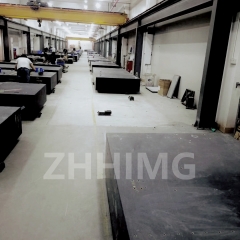Granite beds have become increasingly popular in the manufacturing industry particularly for high-precision measuring instruments such as bridge-type coordinate measuring machines. This is largely because granite beds have a number of unique features that make them superior to other bed materials such as steel or aluminum.
One of the most significant advantages of using granite beds is their ability to reduce the vibrations that can occur during the measurement process. As granite is a naturally dense and heavy material, it has the ability to absorb vibrations much better than other materials. By having a stable and vibration-free base, the measuring machine can provide reliable, accurate and repeatable results.
Another important advantage of using granite beds is their excellent thermal stability. Temperature fluctuations can greatly impact the accuracy of a measuring instrument. However, granite has a very low coefficient of thermal expansion which makes it ideal for use in environments where temperatures are constantly fluctuating. Granite beds are able to maintain their geometry even when they are used for extended periods of time or in varying temperatures.
Moreover, granite is a non-magnetic material which makes it perfect for use in applications where magnetic interference could impact the accuracy of the measuring machine. For example, if the machine is used in an environment where there is a lot of electromagnetic activity, steel beds are likely to be affected by the magnetism. This can lead to inaccuracies in measurement and, at worst, complete measurement failure. Granite, on the other hand, is not affected by electromagnetic activity and can provide accurate and reliable results.
One of the reasons why granite beds are considered to be superior to other types of beds is their impressive durability. Granite is a very hard material which means that it is resistant to scratches, chips, and dents. They are also resistant to wear and tear making them ideal for use in environments where the measuring instrument is subjected to harsh conditions such as dust, debris, and spills.
Lastly, granite beds are also able to maintain their accuracy over a long period of time. This is because granite is a natural material and has a very low absorption rate which means it does not react chemically to dust, oil or other contaminants that may come into contact with it. Over time this can result in a build-up of chemicals which can cause corrosion to other materials. Granite, however, is immune to these corrosive agents which means that it can retain its original geometry for many years.
In conclusion, there are many factors that make granite beds unique and exceptional compared to other bed materials. The stability, thermal stability, non-magnetic properties, durability, and longevity make it the perfect choice for high-precision measuring instruments like bridge-type coordinate measuring machines. By opting for a granite bed, users can be sure that they will achieve reliable, accurate results that are free from the distortions that might arise from using inferior bed materials.
Post time: Apr-17-2024

